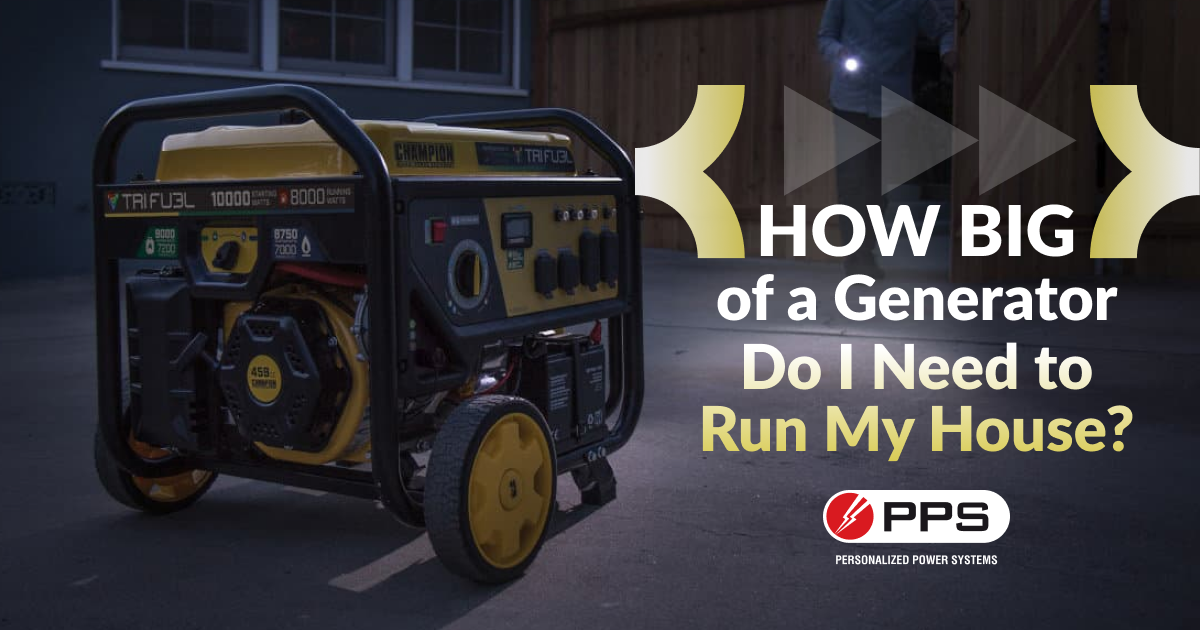Buying a generator for your home is one of the most important investments you can make, especially in places like Texas and Florida, where tropical storms prevail.. As the leading home generator provider, we are frequently asked questions about choosing the right generator for your home. In this blog, we will give you some top tips for choosing a generator that is right for your home.
Things to Think About When Choosing Your Generator
Choosing the right generator for your home can be tricky and isn’t something you should do alone. We recommend contacting a professional like the ones we have at Personalized Power Systems. With their expertise, they can walk you through the selection process. When our customers are at the stage of selecting a generator for their home, we ask them to consider the following factors:
What Are Your Power Needs?
The first thing you must know when choosing a generator is your home’s power needs. What are your essential appliances in the house, and how much wattage do they require? Your power needs will be determined by the total power wattage of all devices you want to power during an outage.
Determine the Starting Wattage
Certain appliances like air conditioners and refrigerators require more power to start up than run. You will need to identify such appliances and determine their starting wattage to ensure that the generator you choose can handle that initial power demand.
What Size Generator Do You Need?
With the total power wattage and starting wattage needs in hand, you can now choose the size of the generator that will accommodate those needs. Most residential homes are powered by 5,000 and 7,500 watts of power, depending on their size.
Consider the Fuel Type?
Another important consideration to keep in mind is the fuel type you need to power your general. There are various fuel types like gas, propane, diesel, etc. The fuel type you choose will greatly depend on what your home is powered by, which will also be a significant deciding factor for the price you pay for the generator.
What Type of Generator is Best for Home Use?
There are several types of generators on the market, and the best one for the home will depend on your specific power needs, budget, and preferences. When the power is out, some people just want to make sure their kitchen appliances are working to ensure that nothing goes bad and they are fed. However, others want their whole house to be powered as usual. For the most part, there are four different types of generators that include:
Portable
These are cheap and easy to use, but they are loud and typically not strong enough to power more than one appliance.
Standby
Standby generators are reliable and can power the entire home when necessary. Though they are more expensive, their power and convenience pay for the cost when the power lines are down.
Inverter
Inverter generators are a newer type of generator that produces clean and stable power for sensitive electronics like laptops and smartphones. Inverter generators are typically smaller and less powerful than other generators, so they may not be suitable for powering your entire home during a power outage.
Solar-powered
Solar generators use the sun to produce electricity. This is an eco-friendly option that is still very reliable for backup energy. However, because they rely on the sun, their power may not be as strong if there is limited sunlight.
Questions About a Home Generator
How Many KW is a Typical House?
In the United States, the average kilowatt usage in a typical house is 886 kWh per month.
How Much Does a Typical Generator Cost?
The average cost of a whole-house generator can range between $4,000 to $25,000. The cost takes into consideration these factors:
- Power output required
- The generator’s fuel source
- Brand of the generator
- Any additional features
- Installation costs
- Maintenance
Check out our blog post where we discuss how to afford a generator for your home.
Call Personalized Power Systems for Your Generator Installation Needs
Is your home equipped with a standby generator yet? If not, contact PPS today to get the purchase and installation process started. Be prepared for this year’s hurricane season with backup energy.


